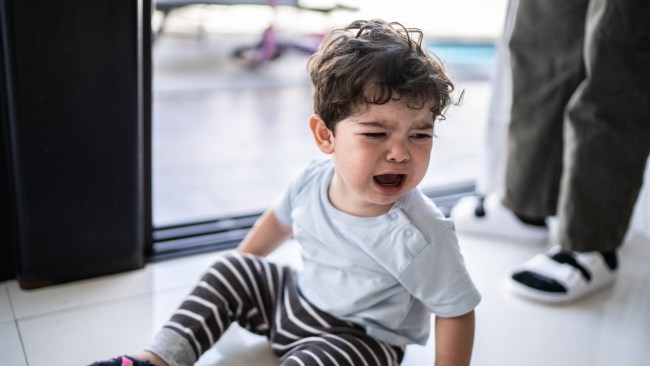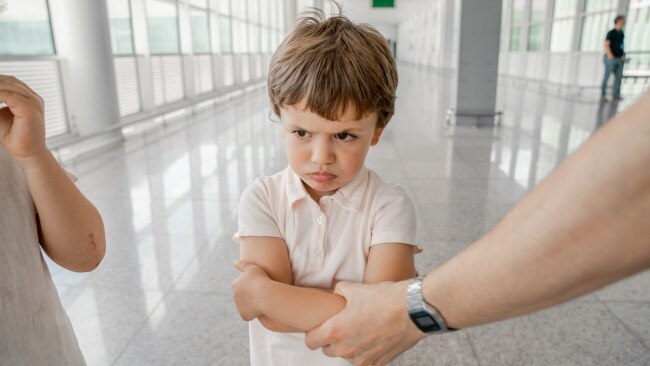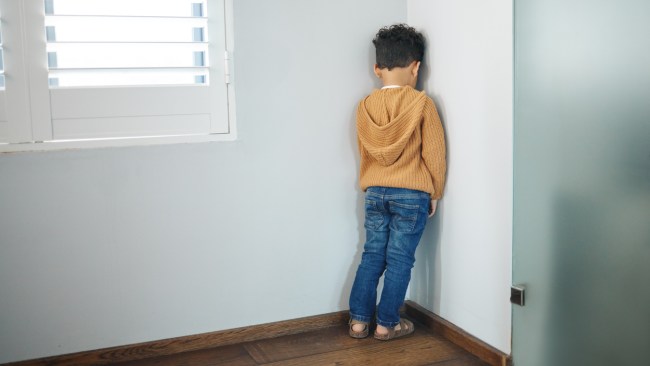'This style of parenting is doing more harm than good'
I grew up with more “You wait till your father comes home” than you can count, but is it the right approach?
I recently flew to Queensland with my husband and toddler to spend Easter with my in-laws.
After checking in, we decided to have a coffee in one of the cafes and await our boarding call.
It was here we saw two parents and their son, and her words left me a little uneasy.
Want to join the family? Sign up to our Kidspot newsletter for more stories like this.
“If you don’t stop…”
While I firmly believe in respecting others' parenting choices, I couldn't help but feel uneasy, especially for the child's emotional well-being.
However, as an outsider it seemed this mum and dad were doing more harm than good with the way they spoke to their three-year-old.
They sat beside us in the cafe and just so happened to sit in the row behind us on our flight back to Sydney, so I had front-row (or forward-row?) seats of the drama unfolding before my eyes.
If the child walked away from the table, the mum said something like, “If you don’t come back here, I’m going to leave you here and catch the plane without you.”
When he was trailing behind when walking to the gate, the father said, “If you don’t hurry up, I won’t let you on the plane.”
And then, on the plane, it just got worse.
From what I could tell from experiencing one too many missed nap episodes with a toddler, the little one was tired and had a little cry, which, in my mind, wasn’t a big deal and didn’t bother me.
However, it seemed I was alone.
“If you don’t stop crying, I’m going to leave you on the plane,” the mum snapped at the little boy.
“Yeah, and Nanny won’t want to see you if you’re crying,” the dad added.
Introducing our new podcast: Mum Club! Listen and subscribe wherever you get your podcasts so you never miss an episode.
I’m a 90’s baby
Now, before you tell me we’re too soft on our kids and they need some tough love, I respectfully disagree.
As a child of the 90s, I grew up with more “You wait till your father comes home” and “Do it again and see what happens” than you can count.
But this doesn’t mean it’s the right way to approach talking to your child… sorry mum!
What is fear-based discipline?
Fear-based parenting involves using threats or punishments to make children do what parents want.
This can include things like threats, timeouts, spanking, or taking away toys.
Fear-based parenting isn't just about being strict, and any parent trying to protect their child by scaring them into not doing certain things is fear-based parenting.
RELATED: Bluey character criticised for bratty behaviour

What’s so bad about it?
According to PsychCentral, parenting that uses threats or fear-based discipline “can affect [a] child’s development, mental health, and [a parent’s] relationship with them.”
The article continues by saying that while “it’s perfectly OK and only human to get upset at your kid sometimes,” it’s crucial to remember that how you respond to your child in these situations can have “a significant impact on their development, mental health, and, of course, your relationship with them.”
If your response is driven by fear, or if you induce fear in your child to get them to follow your instructions, you may be practising fear-based parenting.
Clinical psychologist Dr Stuart Ablon revealed, “Fear-based parenting is when parents use power and control to get their kids to comply with expectations.
“The idea behind fear-based parenting is that if children fear the consequences of not complying with our wishes, they will be more likely to do what we say,” he added.
Fear-based parenting can lead to negative impacts on children's mental health, including decreased self-confidence, anxiety, and difficulties with resilience, as well as increased likelihood of depression, anxiety, and behavioural disorders.
It can also result in child rebellion against such control, damaging the parent-child relationship over time due to anger and mistrust and ultimately leading to a more distant relationship as the child grows and seeks autonomy.
How to parent without fear
As an occupational therapist, certified lifestyle/parenting coach, and mother of four, Ashley Patek believes that connection is the “antidote to control and punishment.”
“Parenting isn’t something we do to our children; it is something we have with them. It is a relationship,” she said.
“A relationship is about connection.
“We can choose to use our children’s need for connection against them, but when we lose connection, it pulls us out of our relationship with our children, and ultimately we lose our power to parent.
“And thus, we find ourselves relying on fear and control because we have lost authentic influence.”
Patek believes there are five ways to employ connect-based parenting over fear-based parenting.
RELATED: My husband won’t stop hitting our toddler

Be curious
She first recommended a parent “Approach your child’s behaviour with curiosity”.
It's important to remember that what we often perceive as misbehaviour is actually a sign of an unmet need, a lagging skill, or emotional overwhelm.
Instead of reacting with frustration or anger, parents can approach challenging moments and meltdowns with curiosity and compassion.
By asking ourselves, "What is really going on here? What is my child trying to communicate?" we can better understand their needs and offer support.
How we respond to our child's distress call can significantly impact how they process the situation and react in the future.
Check yourself
Patek then suggested parents examine their expectations
It can be challenging to navigate the numerous opinions and suggestions on where children should be developmentally.
It is essential to recognise that every child follows their own timeline, and it may not align with societal expectations.
When it comes to high-stress events, consider whether the expectations are appropriate for your child's age and developmental stage.
It is crucial to keep in mind that just because a child may excel at something a few times does not mean they have fully mastered it.
“Connect before you redirect”
Patek’s third tip examined the idea of connecting before redirecting.
“I love a good “and” statement,” she said.
“I may not like the behaviour I see from my child right now AND there is an emotion underneath that I can validate.
“When we connect with our children before addressing the behaviour, not only do our children feel seen and heard, but they move into a brain state where they can process whatever follows.”
RELATED: Why the Nacho Parenting style works for our family

Time-in is the new Time-out
Consider coming together at the end of the day to discuss and reflect on the emotions you or your child experienced.
Incorporating emotions into daily conversation can foster a deeper connection and understanding between individuals.
It's important to allow space for these emotions without trying to change or fix them. This can help to reduce the frequency and intensity of meltdowns.
Looking at yourself
Patek ended with the idea of understanding your triggers.
“If we want to lean into connection-based parenting and out of fear-based parenting, it starts with us - our childhood, our emotional wounding, and our translation of what is happening in the present,” she said.
“In connecting with ourselves - and even our inner child - we gain a deeper connection with our sons and daughters. And thus, we begin to break the cycle of fear.”
We’re all learning all the time
Patek’s tips offer useful insight into taking a moment to pause and assess bad behaviour and respond appropriately without threatening our kids with abandonment and ultimatums.
As parents, it often feels like we’re learning just as much every day as our kids.
While each parent’s approach is different, it’s fair to say we don’t always get it right, and we go to bed thinking we’ll do better tomorrow.
More Coverage
Originally published as 'This style of parenting is doing more harm than good'





